Has Twitter Had a Far-Right Bent for Years? Are #TheTwitterFiles a Fraud? The Debate Leads to Strange Words About Me By “Dilbert” Creator Scott Adams and Even Elon Musk Himself
If you work on controversial topics, you draw attention from polarizing people. But my debunking of a major #TwitterFiles meme led to odder interactions than I expected—and some explosive revelations.
Introduction
My late father, Robert Abramson, was a huge fan of Dilbert. This was before that well-known comic strip’s creator, Scott Adams, transformed himself seemingly overnight from a visual artist into an ersatz political pundit. My dad was a moderate Democrat in his retirement, and certainly he detested Donald Trump, so I know he would have had no patience for the man Adams chose to become (or simply reveal himself to be) during the Trump era.
My father died in April 2020, but I don’t think he’d been following Adams’ antics much—if at all—in the years before his death, and in retrospect that was clearly for the best.
The New York Daily News and others have reported on Adams’ “many controversies and inflammatory comments”, which have led to the cancellation of Dilbert in newspapers across the United States. Dilbert is a comic strip about the banalities of office life in America—which my father knew much about as a product manager for now-defunct computer company Digital Equipment Corporation in the 1980s, when the computer industry was a heady but sometimes demoralizing space to toil in (see the excellent television drama Halt and Catch Fire for another view of this)—and I can still remember how, as children with no money and no sense about gifting, my sisters and I would make sure that at least one of the gifts we got our father for his birthday each year was a Dilbert desk calendar. It worked out well because my father was born in January; his birthday, January 18, was just last week. He would have been 81 in 2023.
I won’t detail here all of the stupid things that Scott Adams has said to become such a controversial figure—as they’re numberless, and after all, we all say stupid things at times, though few of us things as spectacularly tone-deaf and preposterous as Adams has said—but I will at least offer the summary from the Daily News article referenced above:
In 2019, following a deadly shooting at a festival in Gilroy, California, Scott Adams took to Twitter to promote his app WhenHub (he later apologized).
He has also pondered the accuracy of the Holocaust death toll and suggested that teen boys are driven to violence by a lack of sex.
In 2020, reflecting on the cancellation of the TV adaptation of Dilbert decades earlier, he tweeted, “I lost my TV show for being white.”
Adams claimed that wasn’t the first time he suspects being white worked against him professionally.
He has also joked on Twitter that he was going to “self-identify as a Black woman” so that he’d be considered for the Supreme Court.
So one could be forgiven for lumping Scott Adams into the tragicomic “hardest-thing-to-be-right-now-is-a-straight-white-man” crowd, whose foremost figures are—one can’t help but note—fabulously successful straight white men who have taken their celebrity to even higher plateaus than they’d previously imagined possible by speaking to the grievances (and more importantly, the wildly misdirected anger) of less financially successful straight white men.
In any event, you can read about other rank absurdities authored by Adams, none of the cartoon (but some of the cartoonish) variety, at Gizmodo (link), Yahoo (link), The Baltimore Sun (link), and Forbes, the last of which had this to say on the Dilbert creator:
Donald Trump’s latest campaign to stamp out the immigrant wave that has “infested” (his word) America has alienated even some of his staunchest supporters.
Not Scott Adams.
Always the entrepreneur, the creator of the Dilbert comic strip has lately positioned himself as the defender and interpreter of all things Trump.
So far it’s been a winning bet. Adams’s book Win Bigly: Persuasion in a World Where Facts Don’t Matter has achieved bestseller status and his blog has racked up a whole lot of eyeballs. Like a hermit crab that can sense when to skitter along the ocean floor from one host shell to another, Adams has found the perfect mechanism to protect his career in the face of a newspaper industry that is collapsing around him.
In fact, just yesterday Adams uncovered a new opportunity to spread the word about his revamped brand. In response to the children-in-cages news cycle, he recorded an episode of his video blog where he defended the President’s policy as the only defense against an uptick in human trafficking.
Does Scott Adams really believe what he’s saying? Who knows. But really, it’s beside the point. It is clear that Adams sees the ability to persuade as the ultimate mark of strong leadership, regardless of what cause that persuasion serves. It’s no wonder he sees Trump as his salvation and meal ticket.
Some people have called Adams an opportunist. To this charge, his response amounts to, “Who isn’t?” He has a point. These days those who don’t hone their persuasive abilities become suckers. And in Trump’s America, suckers get squashed.
Forbes goes on to criticize Adams for trying to leverage his skill at—of all things—hypnotism into a role in public discourse as a “persuasion expert” who makes “bold predictions” on virtually no evidence whatsoever beyond his own certitude, which Forbes notes is always presented through a posture of “calm bemusement.”
So, yeah.
That’s Scott Adams in a nutshell.
Candidly, I never understood what my father saw in Dilbert. I found its writing flat and its artwork puerile, and continued to feel this way when I began teaching comic strips and graphic novels professionally as a tenure-track professor at University of New Hampshire in 2015. I may have cited Adams once as an example of how some people can go far on little talent—a phenomenon I admittedly tend to associate with white men like Adams, Trump, and (for that matter) the Republican president who preceded Trump, George W. Bush—but that’s about it. I was frankly a little surprised that my father, an English major at Rutgers University in the 1960s who also made multiple valiant attempts to get through a doctorate in the subject in New Brunswick, was fond of it. But then, save for during a four-year stint working for a large university press in northern New England, University Press of New England, I never worked in a cubicle—whereas my father (like Adams’ “Dilbert” character) did so for many grueling years.
{Note: Fortunately, my father and I were able to bond over a shared fondness for a much, much better comic strip, Bill Watterson’s Calvin & Hobbes.}
In any case, while I seem to recall that I might have tilted with Adams once or twice online in the past—frankly, many have—I certainly didn’t think he’d devote a segment of his popular video blog-cum-podcast to me. But recently he did so, and it opened up a new narrative about #TheTwitterFiles and the Trump-Russia scandal I never would have expected.
The Adams Podcast Takes Me On—But Also, Elon Musk
First, the good bit, at least for my ego: Scott Adams says of me, at one point in his podcast, that “If I were going to hire a lawyer, I might hire him”—insisting that my Twitter presence and online writing indicates I have an aptitude for “good lawyering.”
So far, so good. (My win percentage at trial, for what it’s worth, was about 70%, with my two proudest achievements as an advocate for the indigent being once going 18 months without losing a trial and winning a first-degree murder trial in my twenties.)
Unfortunately, what Adams deems to be “good lawyering” is in fact what an actual attorney would deem bad or at least dangerous lawyering: using trickery to deceive an audience. And that’s is exactly, it appears, what Scott Adams thinks I am wont to do.
Here’s a relevant excerpt from what turned out to be a very strange segment about me:
Do you all know who Seth Abramson [is]? Prominent Democrat and attorney type? And so he often weighs in on the political stuff as [to its] legal ramifications. And he’s a little bit upset at [former Rolling Stone journalist] Matt Taibbi for reporting that [news] stories about Russian bots [in 2018] were oversold to the American public. {NB: See the Taibbi #TwitterFiles thread on this subject here.}
And Seth Abramson is arguing, [in paraphrase], “No, no! We always knew, even back in 2018—Politico reported [it]—that it probably wasn’t Russian bots that were influencing, specifically, the hashtag [on Twitter] ‘ReleaseTheMemo.’”
So there was a question [in 2018] of a [then-GOP congressman] Devin Nunes memo that was classified. People were asking [then-president] Trump to release it. And it did get released. But apparently there was a lot of social media action behind [pushing for] the release. And there was a claim that Russian bots were behind causing the memo to be released.
The counterclaim is that—apparently—Twitter [executives] looked at it [and it] was actually more organic: it was a domestic [operation], [a] sort of right-leaning amplification [by Twitter users and bots inside the United States]. Probably there were some Russian bots in there, but it wasn’t necessarily the whole story.
So Abramson makes a correct and accurate statement that they [the social media users who pushed for the Nunes memo to be released] were probably [in part] domestic bots—and even at the time it wasn’t, maybe, as big a story as we [Trump supporters] remember it. The bots were considered [by major media at the time] some mix of domestic and [foreign].
So far, so good.
For me, at least. Not so good for Elon Musk’s #TwitterFiles operation, which was at the time arguing, via the Matt Taibbi thread linked to above, that in 2018 major media in the United States uniformly sought to convince Americans that Russian bots—and only Russian bots—were amplifying the Devin Nunes memo. Adams agreeing that one of the very first major media articles on the subject did nothing of the sort could be seen as a significant blow to the central premise of a key edition of Musk and Taibbi’s pseudo-journalistic enterprise.
{Note: By way of full disclosure, Nunes’ attorney, Steven Biss, who has been suspended from legal practice in Virginia not once but twice, and had been professionally disciplined in multiple U.S. jurisdictions for filing frivolous defamation claims intended to try to intimidate and harass journalists, is currently suing me for $25 million in federal court for accurately, and with full sourcing, reporting on the November 2020, December 2020, and January 2021 activities of the 1st Amendment Praetorians, a group whose leaders pleaded the Fifth Amendment to the United States Constitution before the United States Congress under questioning about the domestic terror attacks of January 6. Biss also does significant work for the family of Trump adviser Michael Flynn and for another top Trump adviser, Kash Patel; as for the 1st Amendment Praetorians, whose evasion of questioning over January 6 can be found here, they are former post-election/pre-January 6 bodyguards for the Flynns, Ali Alexander of Stop the Steal, Trump adviser Sidney Powell, and oddball CEO Patrick Byrne.
Nunes’ attorney falsely alleges that I’m part of a vast left-wing conspiracy alongside a group of anonymous Twitter users I have nothing whatsoever to do with and do not know the identities of: the #SeditionHunters, whose known major-media partner is actually the New York Times Visual Investigations Unit (which I also have nothing to do with). Nunes’ attorney’s claims are so categorically fanciful that they include claims that I use encrypted messaging apps—when in fact I’ve never used such an app in my entire life. While I of course, as a journalist, would never allow an attempt to defame, intimidate, and harass me in this way to affect my journalism, I do want readers here to know that, along with CNN and the New York Times and other journalists in Mr. Biss’s (and his funders’) sights, I am being targeted in this way.}
The one wrinkle here is the reason Adams decided to bring up my bickering with Matt Taibbi, who I concede I have argued with a number of times online in the past—and, candidly, backchannel as well. Like many journalists, I used to admire Taibbi before he decided to leave journalism and enter the much darker but more lucrative world of far-right propaganda with other opportunists like Glenn Greenwald and Bari Weiss.
Taibbi has followed me on Twitter for many, many years—I do not and have never followed him—and has at times seemed obsessed with me, repeatedly commenting on my writing and research despite the fact that there’s little point in doing so: Taibbi, who lived in Russia for many years and allegedly engaged in all sorts of grotesque misconduct while there, believes the Trump-Russia scandal was a “hoax”, whereas I have spent years of my professional life as a journalist substantiating that the scandal was nothing of the sort. That effort has involved thousands and thousands of major-media citations compiled into three bestselling hardcover books, an ebook, a podcast, a substack, a popular Twitter feed, and a fast-growing Post News feed. I have nothing really to say to Taibbi anymore, and vice versa, because he is for some eldritch reason (or it could just be mountains of cash) committed to running cover for Vladimir Putin and Donald Trump without any compelling evidence in support of his tawdry crusade.
I call my transient spat with Taibbi a “wrinkle” in the Scott Adams-oriented narrative I’m unfolding here because, as Forbes noted above, Adams has a well-documented penchant for hitching his wagon to the star of the nearest would-be authoritarian celebrity-cum-tyrant and seeing how far that sycophancy will take him. For years that man has been Donald Trump, but with Trump’s star now fading a bit—if not so much among his MAGA base as certain MAGA influencers—one might expect Adams to be looking for a new ideological patron. And right now the clearest pick in that direction would be Elon Musk.
Yet when Elon Musk suddenly interjected himself into my spat with Taibbi a few days ago, it was not, as was the case with Adams in his podcast, to declare that “Abramson makes a correct and accurate statement” that contradicts Taibbi’s false claims that (a) the #ReleasetheMemo campaign on Twitter was a big moment in the Trump-Russia scandal, and (b) U.S. media worked long and hard to try to use the #ReleasetheMemo ruckus to claim that Russian bots were a major, abiding pro-Trump force on Twitter.
Matt Taibbi’s jeremiad against major media reporting on the (in fact) here-today-gone-tomorrow #ReleasetheMemo story is bizarre because (c) again, it wasn’t that big a news story (in part because everyone knew Trump would release the titular memo no matter what anyone on Twitter said), and (d) Taibbi can’t possibly claim that there weren’t pro-Trump bots originating in Russia that sought to aid Trump’s political cause before and during his presidency. That is such a settled question in U.S. political history—settled because of a veritable mountain of bipartisan congressional reports, reports from DOJ, and reports from the U.S. intelligence community that say so and prove it with data—that one wonders what exactly the Russophile Taibbi gets out of pretending it’s otherwise.
But instead of simply reading the Politico article I linked to online—an article that said, at the time #ReleaseTheMemo was trending, that it was being supported by bots of unknown provenance that might well have been domestic, or might even have been live users inside the United States who simply love Trump—this is what Elon Musk had to say when he interceded in my dispute with his man Taibbi (Musk is responding here to a Taibbi quote-tweet of something that I had written on my own Twitter feed):
That Scott Adams takes issue with Elon Musk’s reading of my #ReleaseTheMemo stance is telling because Adams does, clearly, have Musk’s attention on Twitter.
In fact, just a day after Elon’s tweet about me we see him responding to Adams on a different topic (specifically, a fairly offensive “bootstrapping” monologue Adams puts into the mouth of a “young, Hispanic Uber driver” who may or may not exist, may or may not have said what Adams says he did, and in any case is being used by Adams to issue a proxy apologia for the excesses of capitalism, the vicissitudes faced by non-whites as a consequence of systemic racism, the effects of Boomer economic policies on Gen Z, and corporate greed and fraud and venality as embodied by Musk himself):
Elon follows only about a hundred accounts on Twitter that aren’t family members, politicians, or institutions, and Scott Adams is one of them—the “Dilbert” account another—so it’s indeed surprising to see Adams diverge from Elon on, well, anything.
Meanwhile, Musk’s knee-jerk propping up of Taibbi is much easier to understand: Musk has invested Taibbi with primary authority to selectively report out carefully curated pieces of Twitter’s internal communications, all of which are designed to discredit Musk’s predecessors at the company—a leadership cadre he detests, likely for having run the company as competently as it did for so many years before Musk bought it and ran it directly into the ground at speed.
Given that Musk has already lost one of the stenographers he chose to disseminate his revenge-porn-like pseudo-journalism—the aforementioned far-right columnist Bari Weiss, who publicly abandoned Musk over his hypocritical illiberalism on free speech—he can ill afford to reveal any daylight between himself and another of his minions.
Thus, his reflexive defense of Matt Taibbi at—at least what appears to be—all costs.
{Note: I am leaving out of this narrative Taibbi’s confusing response to my criticism of his #TwitterFiles coverage of the #ReleaseTheMemo tempest-in-a-teapot, in which he equates evidence that the FBI was influenced by the Steele dossier—which was almost 100% accurate as to its account of Carter Page’s activities in Moscow in 2016—in deciding to seek the first of its four FISA warrants on Page (the latter three of which were granted without recourse to the memo and attributable instead to Page’s suspicious activities) with a statement I made on Twitter years ago noting that the FBI didn’t need to use Steele’s dossier in its FISA warrants because it had ample other evidence it could have used.
I should note here that the FBI investigated Page in the mid-2010s as a possible Russian spy, during which investigation Page admitted to deliberately giving non-public information about the U.S. energy sector to two men he knew were in Russian foreign intelligence. After the FBI warned Page to have no further contact with these Russian spies, the future Trump national security adviser was caught boasting in a letter to a colleague that he was “an adviser to the Kremlin.” This underscores, even apart from the uncanny accuracy of the Steele dossier as to Page’s 2016 activities in Moscow, that the FBI—which by the time of the first FISA warrant on Page already had intelligence from seven U.S.-allied intelligence agencies about secret Team Trump-Russia contacts in Europe—did not need to rely on any part of the raw-intel dossier compiled by Steele that turned out to be, as Steele himself warned the FBI it might, inaccurate or unprovable. You can read more about all this in the 2018 New York Times bestseller Proof of Collusion. For those curious, the seven allied intelligence agencies referenced by the Guardian in the article linked to above were those of Germany, Estonia, Poland, Australia, the Netherlands, France, and the United Kingdom.}
So Here’s Where Things Start to Get Weird…
If Taibbi and Musk didn’t react well to me showing them a now-famous Guardian article confirming that the Trump-Russia investigation was actually informally launched in 2015 on the basis of reliable intelligence from seven allied intelligence agencies, Adams reacted even worse to me citing another now-famous Guardian report that says Twitter has had a systemic right-wing bias ensconced inside its algorithm for many, many years now.
Adams leads up to his fury over the Guardian report by first addressing what he sees as the preposterousness of the Politico article that undermines Taibbi’s claims about the #ReleaseTheMemo imbroglio. Here is what Adams says on his podcast about this latter article:
The claim made in Politico in 2018 by Molly McKew, an “expert on information warfare”….talks about Russian trolls promoting this #ReleasetheMemo hashtag.
And then she concludes that it [the campaign to push the #ReleaseTheMemo hashtag] worked.
She says that by the time the memo got to the president—in other words, Devin Nunes’ classified memo—its release was a foregone conclusion, even before Trump had read it.
She says that that’s a true fact based on the fact that the viral activity [supporting the hashtag on Twitter] was so strong that Trump would basically be influenced into releasing it—and that he would not have been had there been no social media push, and had it not been bot-related.
{Addressing his listeners}: Do you believe any of that?
Well, no one should believe any of that—because that’s not at all what McKew wrote.
This, below, is what she wrote:
In the space of a few hours on January 18, #ReleaseTheMemo exploded on Twitter, evolving over the next few days from being a marker for discussion on Devin Nunes’ memo through multiple iterations of an expanding conspiracy theory about missing FBI text messages and imaginary secret societies plotting internal coups against the president.
#ReleaseTheMemo provided an organizational framework for this comprehensive conspiracy theory, which, in its underpinnings, is meant to minimize and muddle concerns about Russian interference in American politics.
The rapid appearance and amplification of this messaging campaign, flagged by the German Marshall Fund’s Hamilton68 dashboard as being promoted by accounts previously linked to Russian disinformation efforts, sparked the leading Democrats on the House and Senate Intelligence Committees to write a letter to Twitter and Facebook asking for information on whether or not this campaign was driven by Russian accounts.
Another report, sourced to analysis said to be from Twitter itself, identified the hashtag as an “organic” “American” campaign linked to “Republican” accounts. Promoters of #releasethememo rapidly began mocking the idea that they [we]re Russian bots.
(There are even entirely new accounts set up to tweet that they are not Russian bots promoting #ReleaseTheMemo, though their only content is about releasing the…memo.)
But this back and forth masks the real point. Whether it is Republican or Russian or “Macedonian teenagers” [amplifying the #ReleaseTheMemo hashtag]—it doesn’t really matter.
It is computational propaganda—meaning artificially amplified and targeted for a specific purpose—and it dominated political discussions in the United States for days.
That’s right, despite the claims by Musk and Taibbi that major media tried to hide the position of Twitter on #ReleaseTheMemo—and instead push a “Russian bots only” narrative—McKew underscored in the opening paragraphs of one of the first major-media articles on #ReleaseTheMemo that “analysis said to be from Twitter itself…identified the hashtag as an ‘organic’ ‘American’ campaign linked to ‘Republican’ accounts.”
So far from U.S. media obscuring what Twitter was saying behind closed doors, and far from Twitter hiding it from major media to run cover for elected officials from the Democratic Party, Twitter leaked its internal assessment to major media and major media immediately reported on it, even though the new narrative contradicted what certain Democrats were saying publicly. Media then conceded that some or even all of the bot and live-user activity on Twitter supporting the #ReleaseTheMemo hashtag may have been “Republican” in origin—that is to say domestic, organic and American.
So why have Musk and Taibbi dedicated an entire entry in the #TwitterFiles to the lie that events unfolded otherwise?
For that matter, what does Adams have invested in lying about what McKew wrote?
These end up being the really interesting questions.
Scott Adams Versus Molly McKew
Consider Adams’ anger at the notion, promoted by Molly McKew, that Trump was influenced by the #ReleaseTheMemo campaign on Twitter—in other words, that Twitter algorithms successfully amplified far-right propaganda to the point it changed U.S. public policy (a possibility Adams, Musk and Taibbi seem desperate to reject and that we will return to shortly). Here’s what Adams says on this during his recent podcast episode:
That [the idea that Trump was influenced by the #ReleasetheMemo campaign on Twitter] is the most bullshit claim I’ve ever heard in my life. There’s no explanation [by McKew] of how you would know [that the Twitter campaign] influenced anything.
What’s the mechanism [for determining this]?
….
This is the worst reporting I’ve ever seen! To just say it’s true, with no explanation [by McKew] of how you connect the dots?
So here’s what McKew actually wrote in an article Adams insists he read in its entirety:
Trump, whom the Washington Post reported was swayed by the opinions of some of the congressmen listed above [high-profile individuals who amplified and participated in the #ReleasetheMemo campaign on Twitter], was targeted more than a million times [by the viral campaign]. Fox News personality Sean Hannity, said to speak daily with Trump, was targeted 245,000 times and became a significant promoter of the hashtag.
So at the time, as McKew notes, Sean Hannity was a Trump domestic policy adviser in near-constant contact with Trump, including about the then-unfolding Trump-Russia scandal. Just so, some of those who participated in the #ReleasetheMemo campaign—for instance Rep. Matt Gaetz of Florida, repeatedly referenced by McKew in her massive investigative report—were among Trump’s biggest supporters in Congress, and also regularly advised Donald Trump on domestic political matters.
In other words, Twitter helped a bot-originating (if not bot-exclusive) viral campaign sway pro-Trump elected officials and Trump advisers to a cause the Kremlin was then deeply invested in, and even targeted Trump himself over a million times through what appeared to be human-run Twitter feeds—but were often not. While it is possible Trump would have declassified the Nunes Memo anyway, despite the howls of protest from the U.S. intelligence community insisting that it would damage national security (and further protestations from some journalists that if Trump released the memo he would appear to be endangering U.S. national security for personal political gain), McKew is clearly drawing a line between (a) a trans-Atlantic disinformation campaign and (b) a Washington-based influence campaign that’s hard to deny and points a finger squarely at Twitter as having aided the political agenda of the Kremlin.
All of which suggests that Twitter algorithms operated, in the midst of the 2018 midterm election cycle, to advance far-right disinformation and specifically pro-Russia and pro-Trump disinformation.
That’s exactly the opposite narrative from the one Musk (who recently promoted a pro-Kremlin peace plan in Ukraine) and Taibbi (who promised Americans the Kremlin would never invade Ukraine again after 2014 at a time his writing promoted Russian disinformation) want Americans to swallow.
Where Adams takes his monologue next, as it becomes an attack on both me and major-media reporting, may provide some additional insight into how the story I’m unfolding in this Proof report connects to what I think is finally the main theme of this entire sequence of events: the anxiety daily exhibited by interconnected far-right, pro-authoritarian folks like Adams, Musk, and Taibbi that Americans will soon come to understand that (as was the case, it turns out, in the #ReleaseTheMemo imbroglio) Twitter executives have always been willing to go toe-to-toe with Democratic Party politicians in public and in private, and moreover—and this is the truly sinister turn here, the one that Adams and Musk and Taibbi really don’t want publicly discussed—the longtime willingness of Twitter executives to counter Democratic Party narratives also manifests itself in Twitter’s algorithm having a persistent, unmistakable right-wing bias.
Here’s Adams reaching the apex of his narrative arc about me and (more importantly) Twitter:
The other thing Seth Abramson said is that what Matt Taibbi doesn’t mention—and he [Abramson] says this is a big fault [in Taibbi’s recent #TwitterFiles entry]—that Twitter was actually [in 2018] preferring right-leaning tweets. {Addressing his audience}: Have you ever heard that?
Apparently there’s evidence of this. And wait for the punchline—there’s a punchline at the end.
I’m, like, [deliberately] leading you into something illegitimate here.
Apparently there is evidence that Twitter actually promotes right-leaning tweets more than left. {Addressing his audience}: Do you believe that? How many of you believe that’s a true statement? That Twitter, even historically—[over] the last several years—has promoted right-leaning political tweets over left[-leaning ones]? In [both] headlines and the trending [topics on Twitter]?
Was there anything, maybe, I left out [in what I just said]? Let me say it again—and look for the dog that’s not barking—“Twitter has preferred and highlighted right-leaning political tweets more than left-leaning for the last several years.”
What am I leaving out? You don’t see it? What am I leaving out? Oh man, none of you see it!
This is why it works. This is why Abramson’s trick—I’m going to call it a trick—this is why it works. Not one of you—I don’t think any of you see it.
The country! He [Abramson] wasn’t talking about America. {laughs} He was talking about the world. There are a lot of right-leaning countries. And if you look at all of the countries, and America is just one of them, apparently there is some trend that right-leaning tweets in other countries [besides the United States] were getting promoted [by Twitter].
And Twitter wasn’t aware of it, and looked into it, and may have changed something—I don’t know.
But Abramson is trying to conflate how Twitter handled American politics [and how it handled non-U.S. politics], which clearly [as to the latter] is not going to be the same pattern as the rest of the world. I mean, I think we know that now [about Twitter’s conduct].
So that was a very good lawyerly attempt [by Abramson] to use the fact that people are not going to read the [Guardian] article. Because you had to read pretty far—like you had to get past the first paragraph or so, I think; no, fact-check me, maybe it wasn’t—but if you just read the headline, or [Abramson’s] tweet [embedding the Guardian article], you would assume [the data in the article] was about America, wouldn’t you? Like all of you did!
So that’s the trick. It’s like [a] magician’s trick. [Abramson] made you assume it was about America, but he never said that. He never claimed it was about America. He just allowed you to assume it because he left out the context. Very, very weaselly….he pulled that rabbit right out of nothing.
Keeping in mind that Adams is saying this as a leading public ally and associate of one of the most powerful men in the world right now—Elon Musk—understand that every word of the above is a lie. Demonstrably false. And what’s worse, Adams knows it.
Specifically, all six key points articulated by Adams above are untrue:
(1) None of this information comes from me. Adams is at great pains to say that this data comes from me, and that I am the author of the “trick” and “good lawyering” that leads to this (as he frames it) foundational misunderstanding about how Twitter works inside the United States—a “misunderstanding” that would, were it accepted, spectacularly undercut the core premise of Adams’ friend Elon’s #TwitterFiles project, which is that Twitter is secretly an arm of the Democratic Party. It is vital that Adams, who has exhibited evidence (see above) of an unhealthy obsession with the Holocaust, attributes this data to a “trick[sy]” “weasel” lawyer with an almost comically Jewish name so that his millions of followers—he has 845,000 on Twitter alone, most of them MAGA, meaning tens of thousands of anti-semites at a minimum—can dismiss it as some sort of eldritch subterfuge.
In fact, the only place Adams could have seen me making this statement about “data” is in a tweet where I link to the source of it: The Guardian, one of the most respected media outlets in the United Kingdom (where Adams’ own forebears are from, not that that should matter at all). You can read the full report in The Guardian here, though I unpack most of it in the following paragraphs.
(2) Adams says there is merely some “evidence” that Twitter’s algorithm gives precedence to right-leaning tweets over left-leaning tweets—but in fact the existence of a systemic right-wing bias in the Twitter algorithm has been conclusively proven and unambiguously admitted by Twitter. This is all contained in the very early portions of an article Adams says he read from top to bottom (see below). No wonder, given his alliance with Musk, that Adams must mischaracterize it so! The analysis published the Guardian, and the confession by Twitter, renders the main thrust of the #TwitterFiles project farcical.
So here’s what the Guardian article says in its first sentence (and note that it’s called “Twitter Admits Bias in Algorithm for Right-Wing Politicians and News Outlets”, and that it has as its subhed a confirmation that Twitter’s startling confession stems from internal research, with the subhed being “[Twitter] Home Feed Promotes Right-Wing Tweets Over Those From the Left, Internal [Twitter] Research Finds”):
Twitter has admitted it amplifies more tweets from right-wing politicians and news outlets than content from left-wing sources.
(3) Scott Adams is lying when he says this data relates to Twitter users all over “the world” and “not…America”, as in fact this data focused on just seven countries—including the United States—and it is actually focused most of all on America. To understand how extraordinary this lie by Musk’s ally is, read the second through fifth sentences of the Guardian piece (emphasis supplied):
The social media platform [Twitter] examined tweets from elected officials in seven countries—the United Kingdom, United States, Canada, France, Germany, Spain, and Japan. It also studied whether political content from news organisations was amplified on Twitter, focusing primarily on United States news sources such as Fox News, the New York Times, and BuzzFeed.
The study compared Twitter’s “Home” timeline—the default way its 200 million users are served tweets, in which an algorithm tailors what users see—with the traditional chronological timeline where the most recent tweets are ranked first.
The research found that in six out of seven countries, apart from Germany, tweets from right-wing politicians received more amplification from the algorithm than those from the left; right-leaning news organisations were more amplified than those on the left; and generally politicians’ tweets were more amplified by an algorithmic timeline than by the chronological timeline.
As you can see here, not only was the United States among the seven countries reviewed, but (a) as to its consideration of right-wing news organizations, the internal Twitter study “focus[ed] primarily on United States news sources”, and (b) as to its overall findings, Twitter announced that in the United States (and five other countries) specifically and individually, “tweets from right-wing politicians received more amplification from the algorithm than those from the left; right-leaning news organisations were more amplified than those on the left; and generally politicians’ tweets were more amplified by an algorithmic timeline than by the chronological timeline.”
(4) Scott Adams is lying when he says that the results of the data analysis—whose origin, Twitter itself, he carefully hid from his listeners—were skewed because the analysis focused on “right-leaning countries.” Not only does the U.S. have the most Twitter users of any country on Earth by far—at 78 million, it’s well ahead of #2 Japan, which boasts just 58 million—but 20% of all Twitter users worldwide are American.
This underscores that any analysis of Twitter habits or the Twitter algorithm is definitionally going to disproportionately register the user experience (UX) in the U.S. over any other individual country, and this would be the case even if Twitter had not—as it did here—broken out its results for each of seven countries, including America.
But that’s not all. As you can see from the graphic below, far from being right-leaning countries, the countries Twitter considered in addition to the U.S. are all left-leaning:
In France, voters—a demographic that presumably has some meaningful relationship to the class of politically active Twitter users there—have given the far-right only 15% of elected seats. In Spain, that figure is likewise 15%. In Germany, it is 11%.
Surely, given that Canada and the United Kingdom are often cited by Trumpists as examples of left-wing dysfunction—in both cases, as to the use of government-run healthcare schemes—Adams isn’t referring to either nation as “right-leaning.” And in Japan, the Liberal Democratic Party has been in power for all but four years since 1955.
So not only did Twitter make a discrete finding about right-wing algorithmic bias in the United States, but even if it had aggregated its data, the largest single-nation share with respect to individual users would have come from America; nearly all analysis of media outlets would have related to U.S. news organizations; and the political bent of the nations considered is leftist, rather than (as Adams falsely claimed) “right-leaning.”
(5) Adams well knows that (a) Twitter didn’t merely discover this data after it was published by others, and (b) nothing was done about it by Twitter. So when he says
Twitter wasn’t aware of it, and looked into it, and may have changed something
he is flailing. Twitter did not “look into” something brought to its attention by others, it had sufficient awareness of its own internal systems’ corruption by political biases—categorically in favor of right-wingers, both as to individuals and media outlets—that it was forced to self-report its failures to the world lest they soon be found out by others.
And then, having discovered this fatal flaw in its platform, there is no evidence at all that wholesale changes were made to fix it—as indeed these findings emerged at the tail end of 2021, and Musk began buying shares of Twitter just weeks later (beginning in January 2022). By April 2022, Musk held a majority of shares in the company. The focus of Twitter executives in 2022 was on Musk’s impending hostile takeover, not on rewriting wholesale the highly complex algorithm that’s the core of its business model.
And once Musk came to power at Twitter, it was despite the most recent assessment of the company he’d bought—which told him that his platform’s algorithm had a right-wing bent—that he began trying to convince Americans and Twitter users around the world that the opposite was true. Clearly he knew this was a lie, as if there’s one thing we know about Musk, it’s that he’s been obsessed with the internal findings of Twitter executives in the months and years immediately before his acquisition of Twitter.
But would Elon Musk really orchestrate a fraud on the entire world? Well, you tell me.
No, seriously, you tell me.
(6) Adams is either lying about having read the Guardian article or is lying about the article. Adams makes clear that he read the entire Guardian article; alleges that only my “weaselly” and “tricky” lawyering suffices to pull the wool over the eyes of those who didn’t read the whole article; and insists that my dark genius lies in knowing no one will ever read the article that I explicitly linked to and asked Twitter users to read.
In fact, it is Adams who (a) will not tell people where to find the article, as he does not mention the origin of the data he is discussing, and then (b) mischaracterizes what the article says because he knows his audience can neither find the article nor would they (if they found it) ever read it, as he’s already assured he did so and has characterized its contents perfectly.
It’s an ingenious psyop run by a man media describes as a “persuasion expert”—or, in less favorable terms, a propagandist working in service of American authoritarians.
The Musk-Adams-Taibbi Disinformation Axis Is Now Winning the Information War
Consider the Pew Research poll below (full article here):
Whereas 59% of Republican Twitter users say that Twitter “limiting the visibility of certain posts” is a “major problem” the platform must address, and 61% say “Twitter banning users from the platform” is a major problem demanding redress, only 17% and 6% of Democratic users, respectively, answer those questions in the affirmative.
In other words, Twitter’s internal data confirms that it is left-leaning Twitter accounts that are being systematically harmed by Twitter’s algorithm and right-leaning accounts that are being systematically aided by it—consisted with the experience I myself have had (see below), and exactly the opposite of what Musk, Taibbi, and Adams claim—but Republican Twitter users instead believe that Twitter has historically disfavored them.
How did this mass delusion come about? Because right-wing Twitter users are being systematically lied to on this issue by the aforementioned Musk, Taibbi, and Adams.
But it’s not just that they’re being lied to.
“Being lied to” might imply that Musk, Taibbi, and Adams are “merely” denying that a problem Twitter has admitted exists—based on irrefutable internal data—in fact exists.
But what Musk, Taibbi, and Adams are in fact doing is something far more sinister: they’re selectively citing internal Twitter correspondence from the last few years (the period during which Twitter discovered and admitted it had a massive, systematic right-wing bias) as evidence that the opposite is true: Twitter has a massive, systemic left-wing bias.
Worse still, these lies are sticking.
And worse than even that, these lies—and the overwhelming support for them among Republican Twitter users that Musk, Taibbi, Adams, and others have orchestrated in a disinformation campaign that echoes the #ReleaseTheMemo campaign (inasmuch as it’s now been picked up by Trump backers in the United States Congress)—is being used to justify a sea change at Twitter that tilts the service farther toward the far-right.
Consider the comments on this tweet, in which many Proof readers report seeing endless tweets from right-wing accounts that they don’t follow and don’t want to see.
Musk himself has tried to explain this phenomenon—which means he first had to acknowledge it exists—by claiming that the Twitter users complaining about it must regularly comment on (for purposes of harsh critique) the feeds of far-right Twitter users, which Twitter’s algorithm interprets as those users wanting to see more far-right content. But that’s not what I am hearing from Proof readers, who say they are regularly and involuntarily seeing far-right accounts they have never interacted with in any fashion and under circumstances in which their own Twitter-reading practices do not include following or commenting on or even reading such far-right accounts.
I even tested out this claim myself by seeing which Twitter feeds Twitter’s algorithm would recommend to a new Twitter account with no followers, followings, or tweets.
And who did Twitter recommend content from to this “blank” Twitter account?
Just one person: George Papadopoulos.
That would be the same Kremlin agent and top Trump presidential adviser whose name is all over the Mueller Report, and who attempted to broker a secret Trump-Putin summit (then, aided by Steve Bannon, a secret Trump-el-Sisi summit) during the 2016 U.S. presidential campaign). Readers of the Proof series will be aware that not only was the Kremlin interfering in the 2016 election cycle on Trump’s behalf, but the authoritarian killer Abdel Fattah el-Sisi, the President of Egypt, was in 2016 part of a six-nation pact to work toward Trump’s election that also included Saudi Arabia, the United Arab Emirates, Israel, Bahrain, and, of course, Russia. As it happens, George Papadopoulos is also one of those far-right influencers who has been obsessed with advancing the disinformation of Devin Nunes for years. Consider, for instance, all this:
So even now, in 2023, well into the Musk era, the Twitter algorithm is moving first and foremost—even with “blank” Twitter accounts—to push Devin Nunes-friendly content on unsuspecting users. In fact, just a couple hours before the publication of this article, Papadopoulos became a key player in the Charles McGonigal melodrama described in the next section of this report:
All of the above is terrifying, given that Nunes was a central figure in both the Trump-Russia scandal and Trump-Ukraine scandal, now works at Truth Social alongside fellow Steven Biss client Kash Patel—one of the major Trumpworld movers and shakers in the weeks of plotting leading up to January 6—and is now well-positioned to aid Trump yet again as he seeks to retake the White House in 2024.
For his part, Papadopoulos has been a relentless Trump booster ever since he told Trump, face-to-face, at a national security meeting at Trump International Hotel in late March of 2016, that the Kremlin’s Ministry of Foreign Affairs had secretly made contact with him to set up a clandestine collusion summit between Trump and Putin and a permanent backchannel between the Kremlin and the 2016 Trump presidential campaign. After revealing himself to Trump as an agent of the Kremlin, Papadopoulos was immediately promoted to co-author of Trump’s Russia policy (yes, really; see Proof of Collusion, Simon & Schuster 2018, for much, much more on these astounding events).
So what started, in the first paragraph of this lengthy Proof report, as the story of an idiosyncratic cartoonist my dad once liked now seems like something else altogether.
Why It All Matters
As I put the finishing touches on this massive Proof report over the last few days, the world learned three astonishingly significant things that are relevant to the subject of this narrative:
If you put all these new items together, you get the following interconnected narrative:
The most lucrative tweeter in American history is about to return to Elon Musk’s near-bankrupt Twitter, which could single-handedly save Musk’s demonstrably bad $44 billion investment in the platform;
Musk must justify his reinstatement of Trump—the event that has opened the door to Trump’s lucrative, potentially Twitter-saving return to the platform—by falsely contending that Twitter long systematically disfavored (rather than issued spectacular hidden advantages to) dangerous far-right elected officials like Trump;
as more and more evidence emerges establishing the truth of what I was the first to report on (at HuffPost) six years ago—the New York City field office of the FBI, run by Charles McGonigal, was a nest of pro-Trump sentiment before and during the Trump-Russia scandal—the attempt by the new House GOP majority that Elon Musk openly stumped for on Twitter to frame the FBI as pro-Biden is now more likely than ever to fail, which will force the House GOP to engage in precisely the same sort of disinformation campaign about systemic biases in a massive institution that Musk and Taibbi and Adams have been waging on behalf of Twitter; and
a pretty good sign that Musk is ready and willing to aid Congress in committing this new fraud on the American people (putting aside all the allegations of fraud Musk has faced over the years) is that his first response to the news that Trump is returning to Twitter was to spread a baseless conspiracy theory about pro-Biden deep-state actors inside the federal executive branch—where the FBI also resides.
There’s not a jagged line between these four elements, but a straight one. And indeed, Proof will add one more data-point to this group: that Mr. Trump is rejoining Twitter because he needs to do so to successfully run for President of the United States in 2024, which means that Elon Musk’s willingness to aid and abet false Trumpist and congressional narratives about the Biden administration—which false narratives he is trying to ensure dovetail with his own false narratives about pro-Democratic bias inside Twitter—can only have the effect of propping up a flailing Donald Trump presidential campaign whose success in 2024 could well mean the end of American democracy.
Notably, just as soon as Scott Adams is done attacking me in his newest podcast episode, he goes on to explain that Trump “can’t lose” against Joe Biden in 2024 and will have an “easy” time getting back into the White House if Trump will listens to his—Adams’s—advice on the topic of social media (and, inexplicably, the fentanyl crisis).
If this doesn’t underline what’s really at stake in a story that began with silly cartoons, nothing will.
Conclusion
Journalists never want to become part of a story they are reporting on. And yet, in a way that’s far more true now than it was decades ago, the involvement of a journalist in a story they’re working on often (a) seems inevitable, and (b) is at least capable of revealing some component of the story that wouldn’t have been revealed otherwise.
For instance, readers of Proof and its associated Twitter feed will know that I was shadowbanned on Twitter the very week my bestseller Proof of Corruption came out in September 2020, just weeks before the 2020 presidential election. That book was—and candidly, still is—the most devastating, exhaustive, and well-sourced account of the Trump-Ukraine scandal, a scandal that Devin Nunes was at the heart of, that the #ReleaseTheMemo campaign was tangentially related to, and that indeed may well be the real reason I am now being sued for $25 million by Devin Nunes’ pet lawyer. Proof of Corruption was as harrowing (and wholly accurate, and painstakingly sourced) an account of the private actions of Devin Nunes as its follow-up, Proof of Coup (2022), was of the actions of Michael Flynn. So perhaps it is no surprise that it was during my research for Proof of Coup, excerpts of which I periodically published at Proof, that Mr. Flynn (also connected to Steven Biss) threatened to sue me. And Flynn’s bodyguards are now actually doing so, though whether it’s under their own steam or not is unclear.
Elon Musk has been obsessed with outing his predecessors at Twitter for their alleged penchant for shadowbanning conservatives. We’ve all watched this obsession unfold in real time, with entry after entry in the so-called “Twitter Files.” Yet even though the author of a devastating (and functionally anti-Trump) book was shadowbanned by Twitter just weeks before the 2020 presidential election, and then provided public proof of his shadowbanning, and then led a dramatic public campaign to undo his shadowbanning, Musk will not fold my out-in-the-open experience into his narrative of what Twitter purportedly is to the domestic American political sphere—seemingly because it undermines the pro-Russia, pro-Trump narrative he’s consistently favored.
Just so, Trump and Twitter made Scott Adams famous in a way he apparently always wanted to be: not as a cartoonist, but as a pundit; not as an artist, but as an apologist for authoritarians; not as a purveyor of comedy, but as the prognosticator of future tragedies. He, like Taibbi, has a lot of money wrapped up in denying that Twitter has a right-wing bias, denying that Twitter has fundamentally been the leading digital enabler of Trumpism, and denying that my own words on this or any other subject are proven by all the evidence we presently have. In this third crusade as much as the first two, Adams has enjoyed the company of Taibbi and Musk as eager fellow-travelers.
So in a certain sense, I’d be part of this story even if all three of Adams, Musk, and Taibbi hadn’t brought me into it. Yet being brought into the story gives me, now, the opportunity to explain how and why certain events have happened, how and why these events matter, and what exactly they reveal about the anxieties and ambitions of three powerful, high-profile far-right men. And make no mistake, all three of these men are dangerous in their several and intertwining ways and ambits: as advocates for authoritarianism, disseminators of disinformation, and fanboys of a sort of nihilistic chaos that’s become far too prevalent on social media in the 2020s, they and their ilk could determine the final result of the next presidential election in the United States.






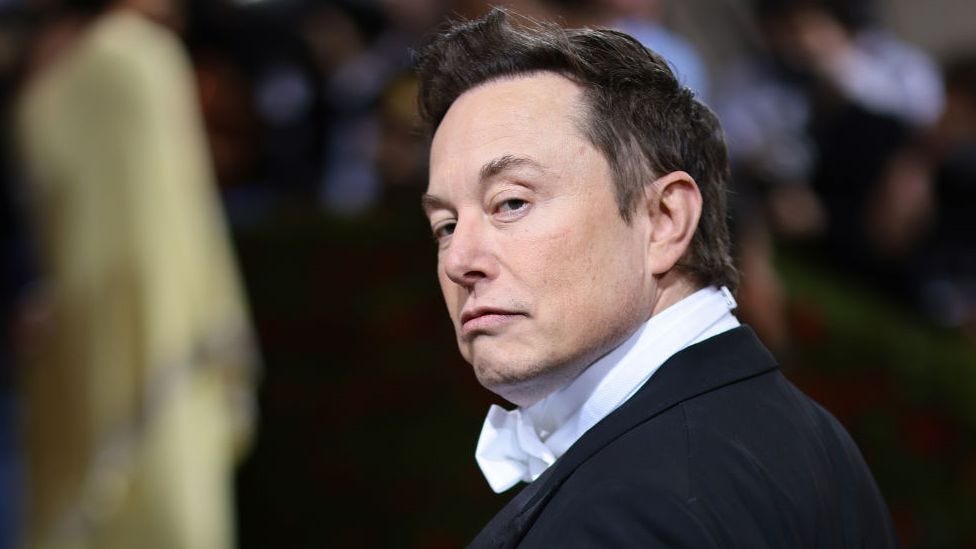
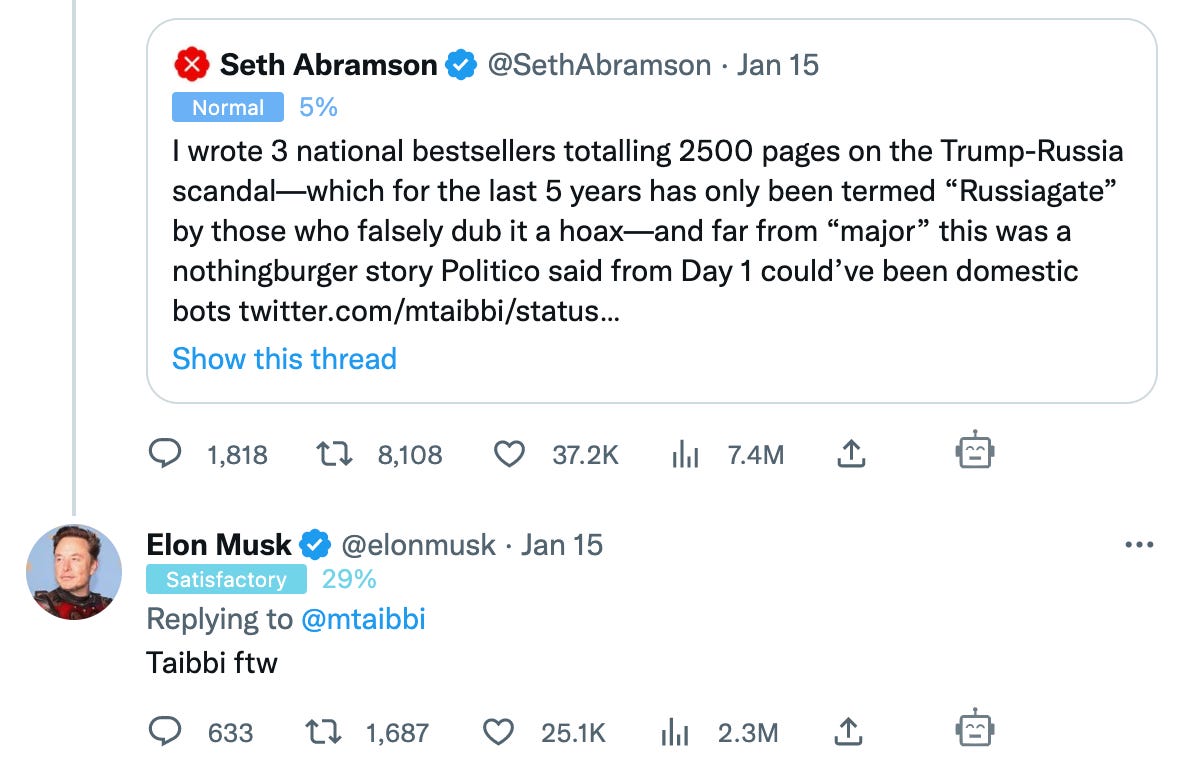
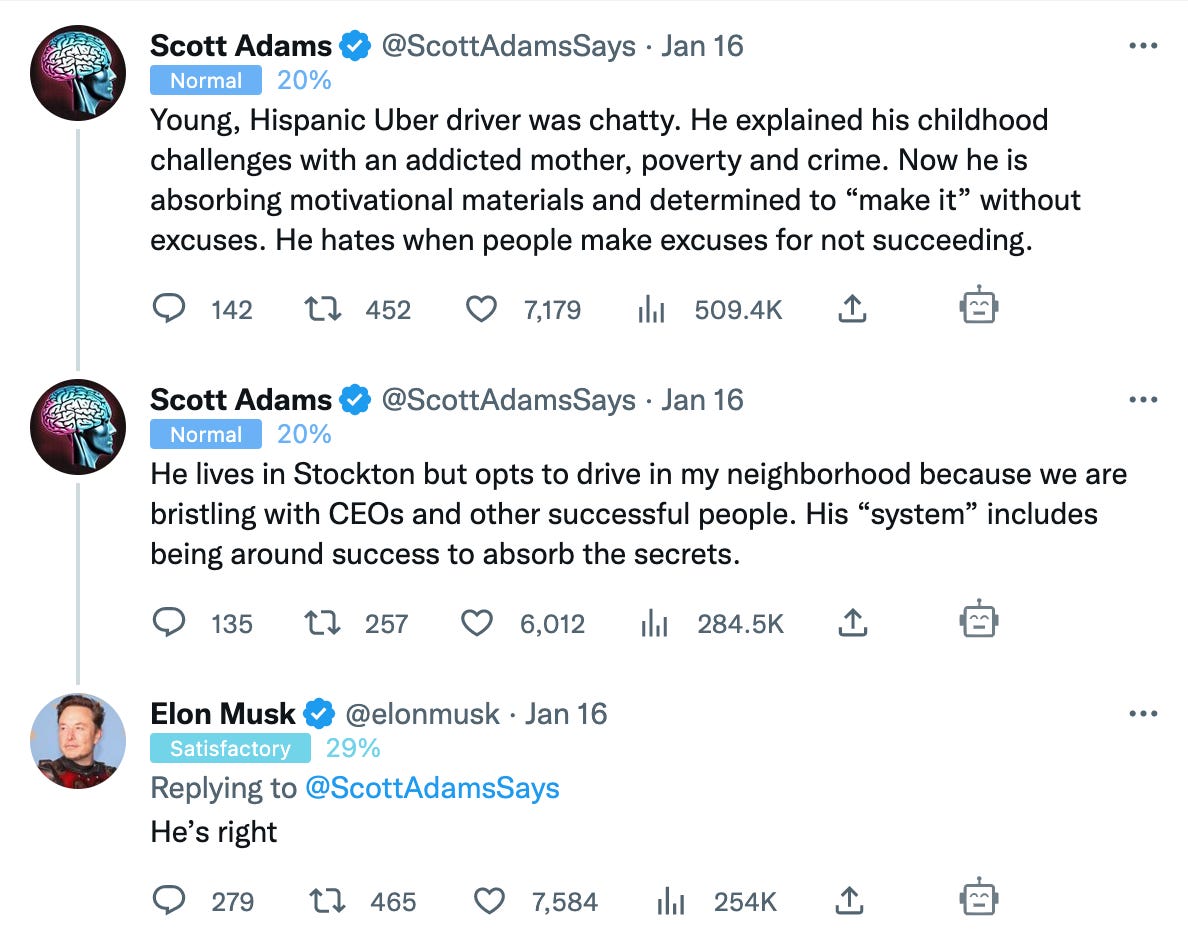

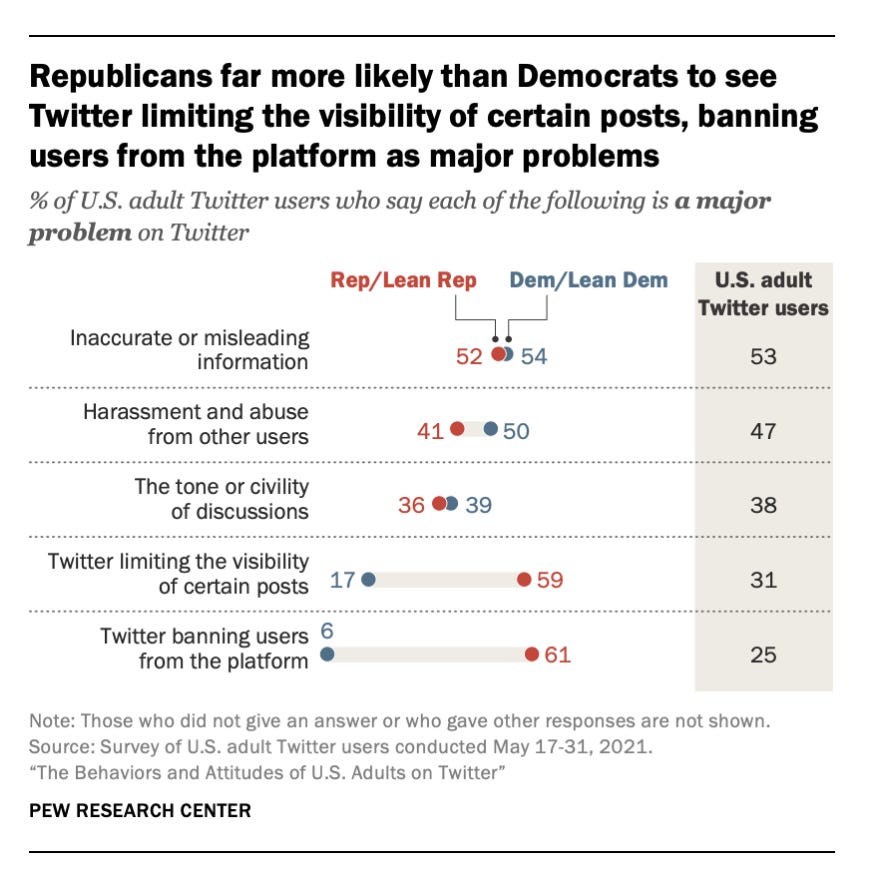
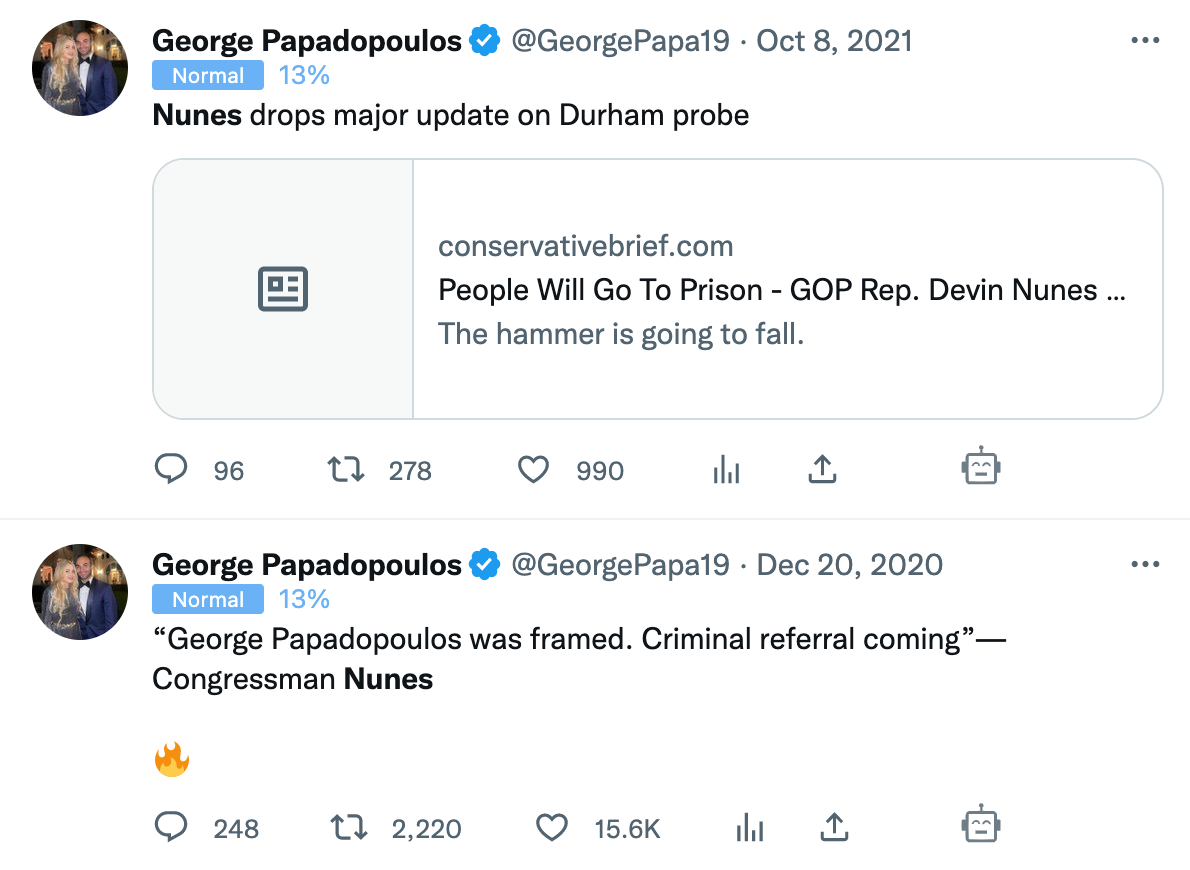
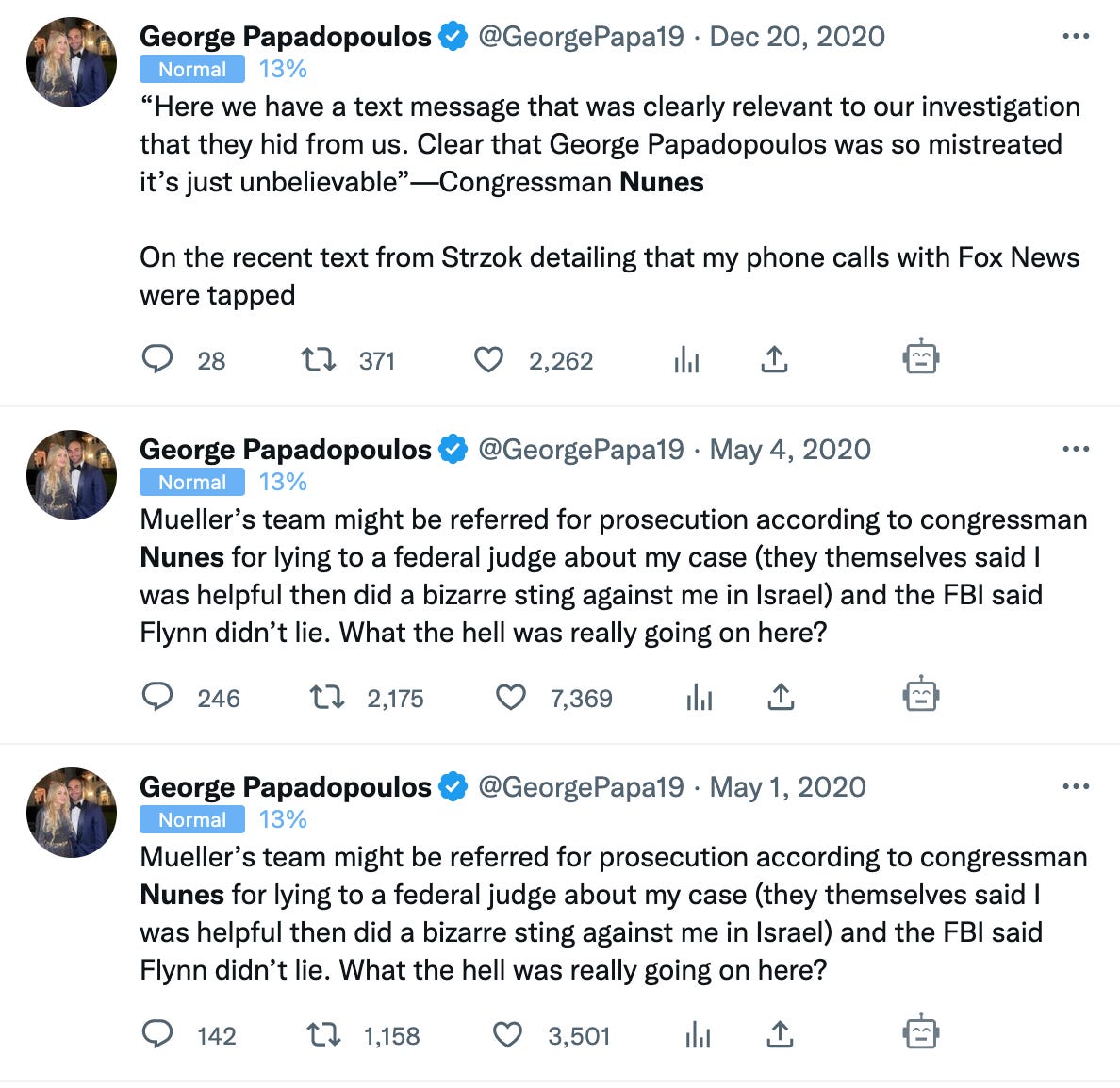
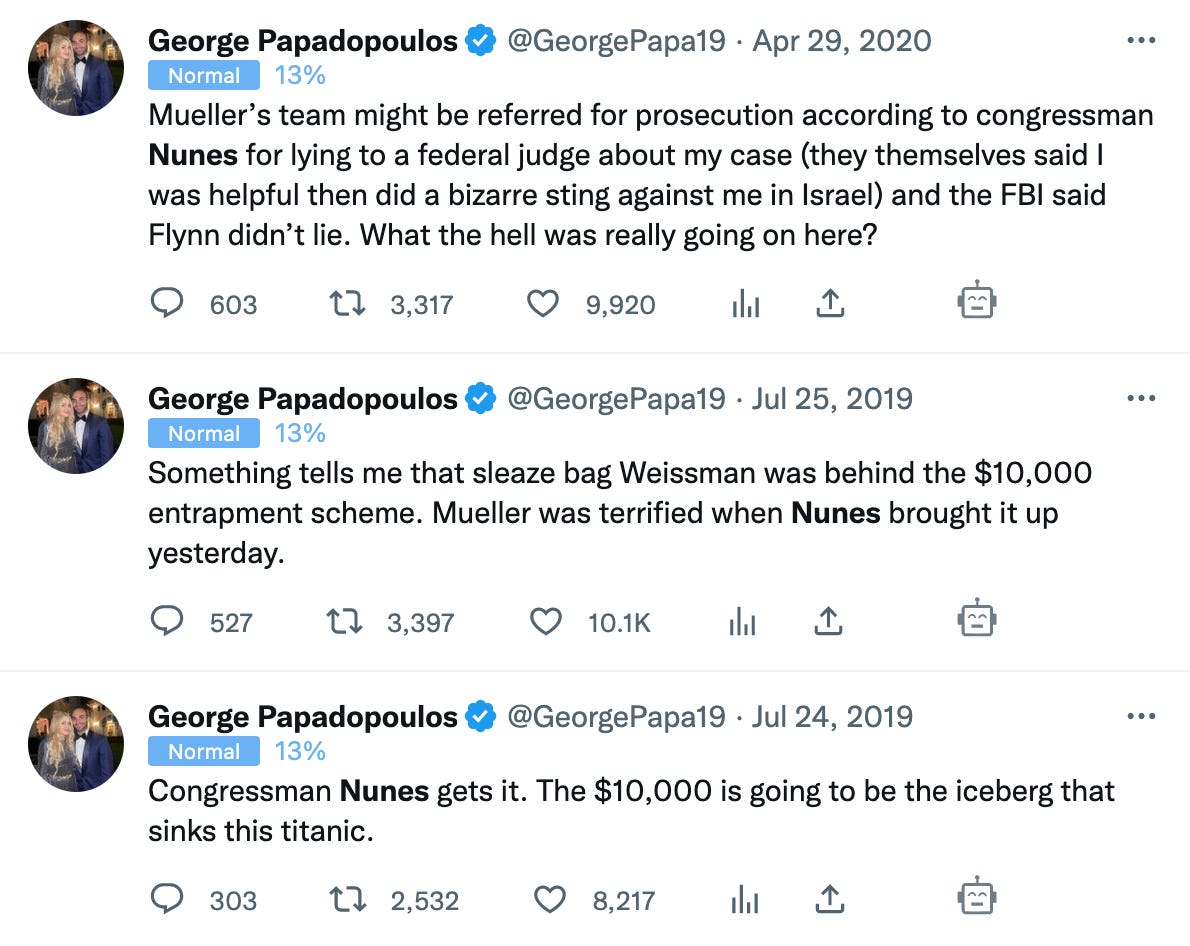
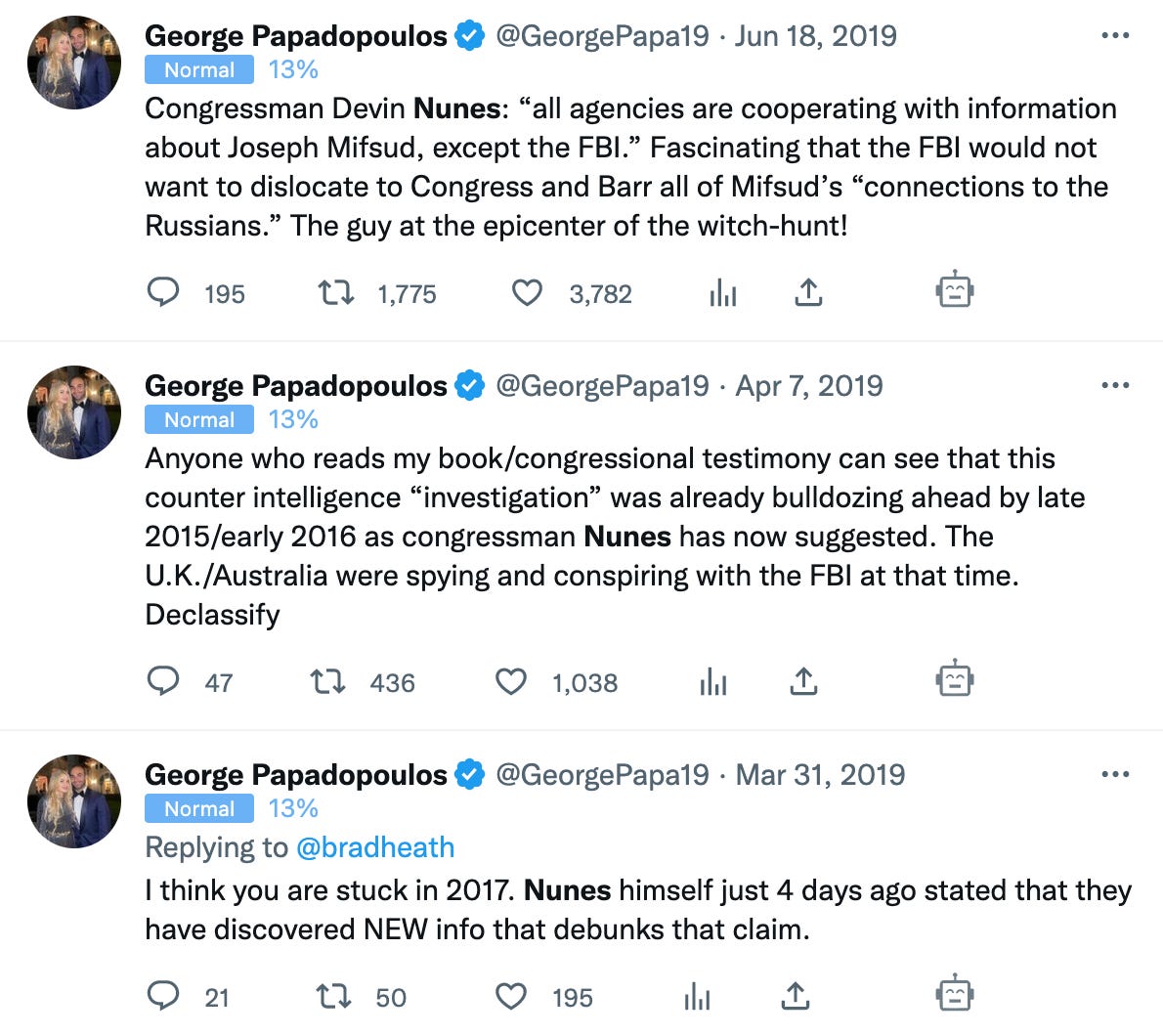
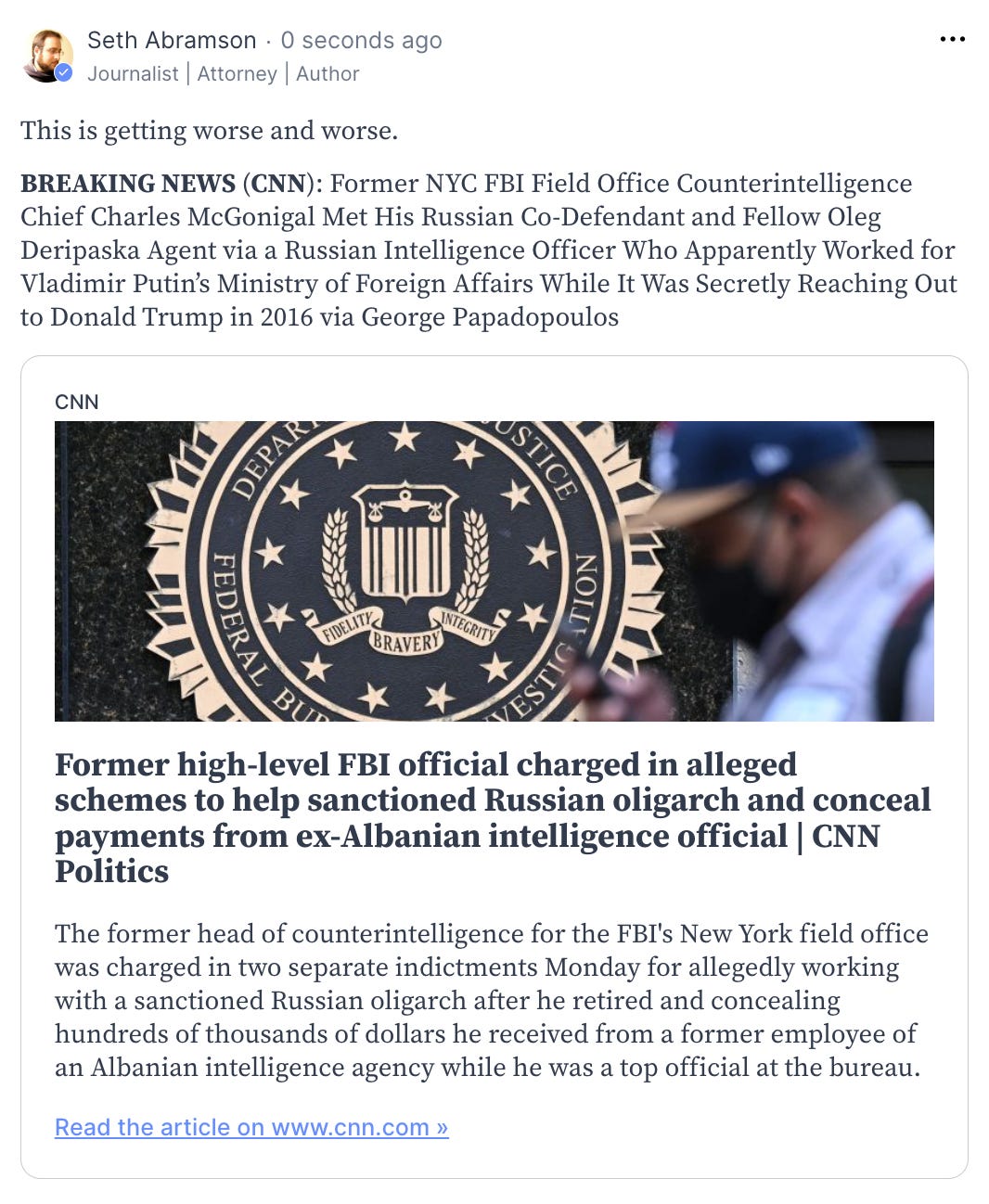
A quick comment about your father’s interest in Dilbert: although I am 15 years behind your father, I definitely relate to the cubicle hell of the DEC and IBM days of the 1980’s. Dilbert spoke to me then, even as a manager, that I was not alone in the disillusionment of America’s ‘great’ corporations. They were merely financial machines serving their top executives. I and my organizations were cogs to their benefit. Therefore, I understand the miasma that has middle class in addition to the blue collar citizens that find promise in the fascist trump movement, as empty as it actually is. Adams became rich on Dilbert. He doesn’t have to deliver a good comic product anymore. And he has the luxury of whining in the trump camp, as devoid of truth, merit and integrity as it is.
The I'll stay on Twitter till it dies crowd needs to get off. Nothing good will ever come of it.